Grasshoppers play an essential role in maintaining ecological balance. But should you be careful when you encounter a grasshopper? Do grasshoppers bite?
Yes, grasshoppers can bite, but they aren’t a threat to humans, they aren’t venomous. When threatened by predators they use other self-defense mechanisms like spitting, poisoning, and pressing their spiked legs. Even if they do bite their mouths are very tiny and can’t break through the skin.
The rest of this article will explain a few topics related to this question in great detail, including the dangers grasshoppers pose, whether grasshoppers are poisonous, how they defend themselves, what they are attracted to, how to get rid of them, and the benefits of grasshoppers.
Do Grasshoppers Pose Any Danger?
Grasshoppers, in general, are harmless. They do not sting or possess venom. However, these insects are considered pests as they eat up plants in gardens. A few grasshoppers can cause serious damage to crops in their lifetime. If they are in plague proportions they can rapidly decimate crops.
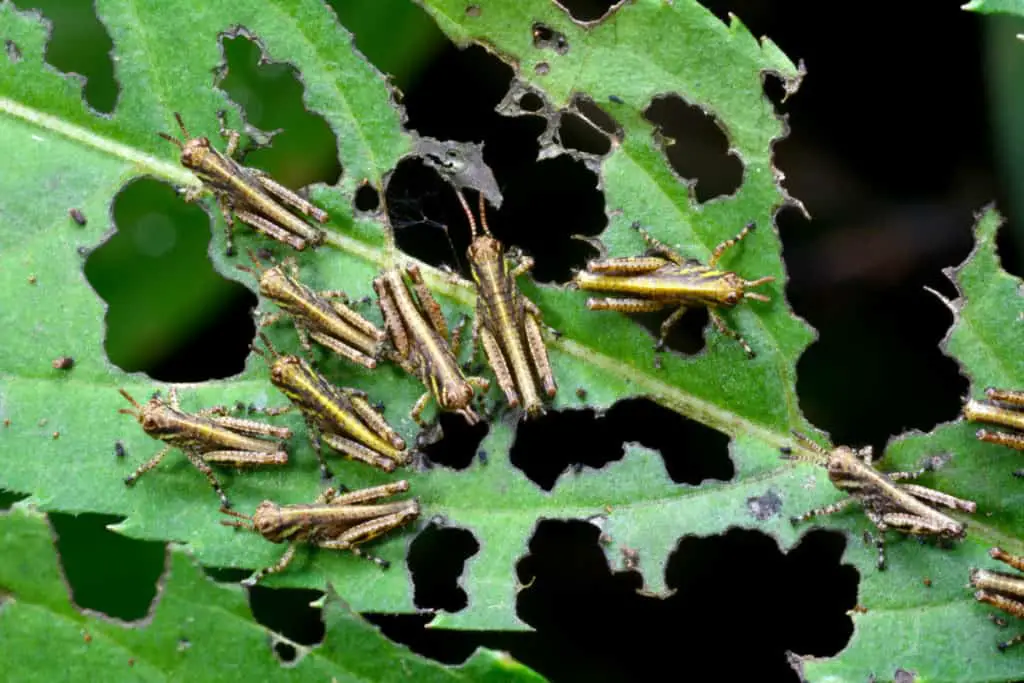
Apart from the damage to plants, grasshoppers do not pose any danger to people. Although they do not bite to defend themselves, pet grasshoppers can accidentally bite humans during hand-feeding. However, you need not worry even if they bite because their mouth is too small to cause irritation.
When grasshoppers feel threatened, they spit a brown liquid called defensive regurgitation. These won’t cause any problem in humans because the liquid is a partially-digested plant material that is not harmful to humans in any way.
While most grasshoppers do not sting, some grasshoppers can inject a kind of poison into predators. These species are typically bright-colored, making it easier to differentiate them from the species that do not poison. Again, the poison does not pose any threat to humans. Some may feel a slight irritation at the sting site, but it will die off soon.
Keep in mind that ingesting grasshoppers is not a good idea. Fried grasshopper dishes are popular in places like Thailand, Mexico, China. However, ingesting grasshoppers can create problems if there are leftover chemicals and pesticides on their body if they have been sprayed by farmers or by a gardener before.
Grasshoppers can also act as carriers for roundworms and other parasites. Furthermore, if the grasshopper you are ingesting is a poisonous one, the poison can get inside your body and cause further problems. Therefore, do not consume grasshoppers.
Are There Any Grasshoppers That Are Poisonous?
There are numerous species of Grasshoppers, all of which are part of the Orthoptera order, along with cockroaches. Most grasshoppers do not poison their predators. All they do is spit a brown liquid or press the predator using their spiked legs.
However, there are a few species that inject poison when they feel threatened. But the good news, it is easy to identify these species due to their brightly colored bodies.
Aularches miliaris is a species of grasshopper that releases toxic foam when provoked. But these toxins do not affect large predators, such as humans and frogs.
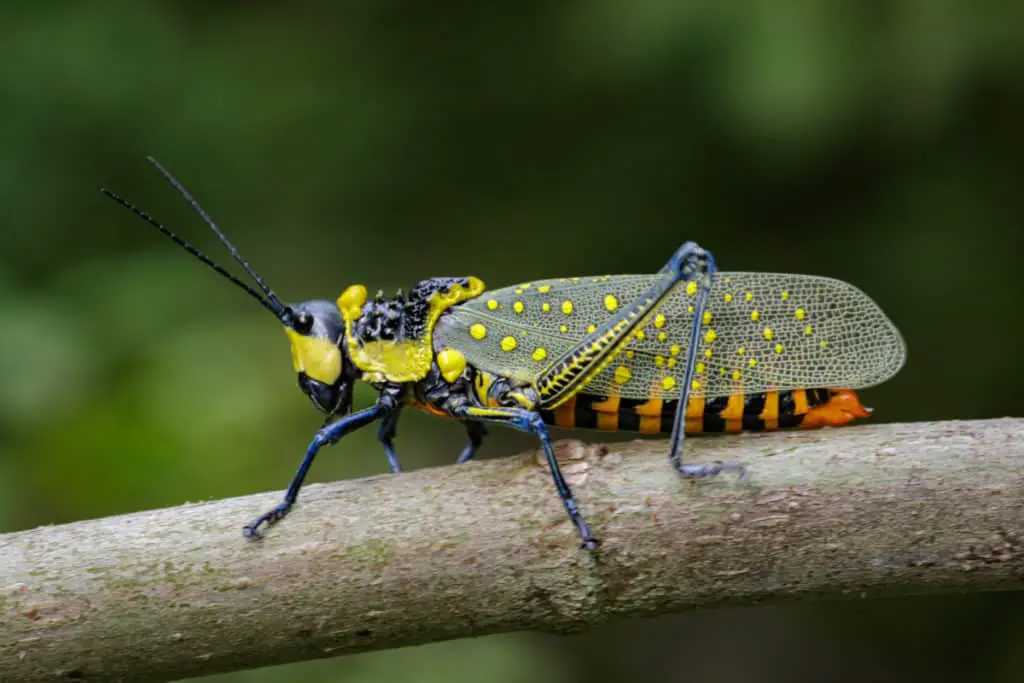
While the poison of grasshoppers is not a potential threat to humans, ingesting poisonous grasshoppers can become problematic. Fried grasshopper dishes are popular in some parts of the world, namely, Thailand, China, and Mexico.
Another problem with consuming grasshoppers is that there may be pesticides or chemicals on their bodies. Grasshoppers are mostly herbivores and often choose to hang out in crop fields and gardens. Since farmers spray pesticides in their crop fields, these chemicals can remain on the body of the grasshoppers.
To avoid complications, refrain from eating unknown grasshoppers.
How Do Grasshoppers Defend Themselves?
If grasshoppers do not bite, how do they defend themselves when they feel threatened? The first thing these insects do when they encounter a predator is run.
Grasshoppers have a keen sense of their surroundings and they are extremely agile insects due to their powerful legs. With one jump they can rapidly escape the danger. If you have ever tried catching one you will have experienced this.
Apart from fleeing, here are a few things grasshoppers do to defend themselves:
- Spitting
- Spiked Legs
- Poison
1. Spitting
Spitting is the most common defense mechanism that helps grasshoppers to escape from their predators. They spit out a brown liquid called defensive regurgitation. It is also called “tobacco spit” or “tobacco juice” due to its color (not because the liquid contains tobacco).
The spit is not very dangerous for large predators and humans. This is because tobacco juice is just digested plant material. The liquid can cause slight skin irritation in some people, but it is mostly harmless.
2. Spiked Legs
Although grasshoppers cannot sting due to because they don’t have a stinger like that of a honey bee or wasp. They do have spines along their legs that can be used to press onto the skin and cause irritation. This is another way in which grasshoppers defend themselves.
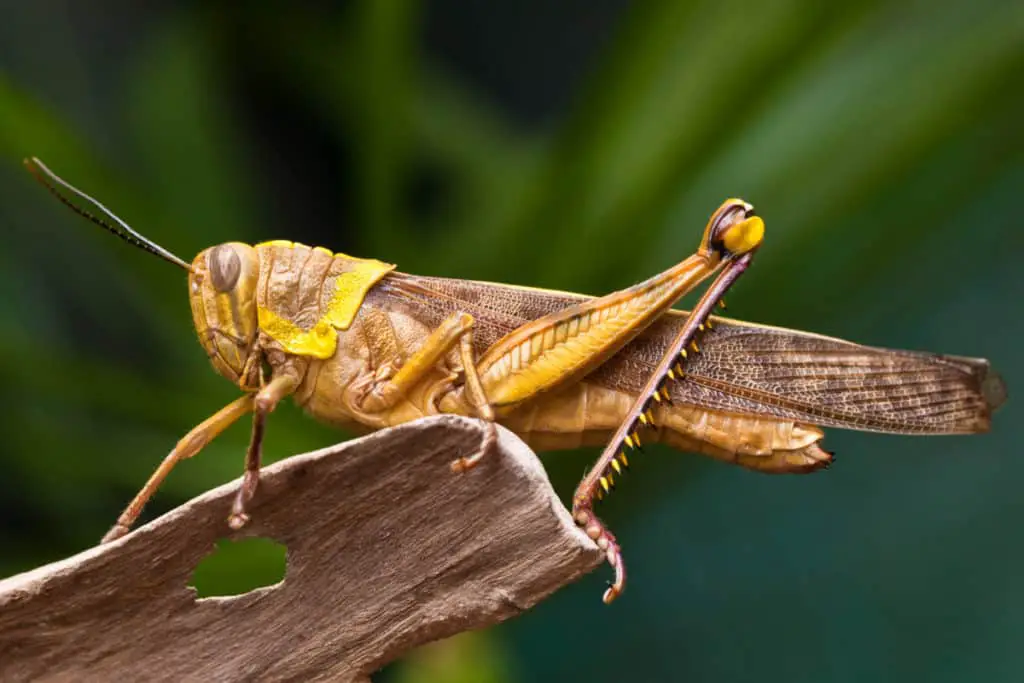
The spiked legs may create the sensation of a sting, but it is very mild and free of venom. To avoid contact with the spiked legs of grasshoppers, handle the insect gently without squeezing it on any part of its body.
3. Poison
Most grasshoppers do not inject venom or poison to defend themselves. However, some species transfer the poison to its predator. Poisonous grasshoppers have bright coloration, making it easier to spot them and prevent contact.
The Dictyophorus Spumans grasshopper is from South Africa, also known as the Koppie Foam Grasshopper produces a toxic foam the is poisonous to its predators. The toxicity of the foam comes from toxins in the plants that they feed on. One of these plants is Milkweed.
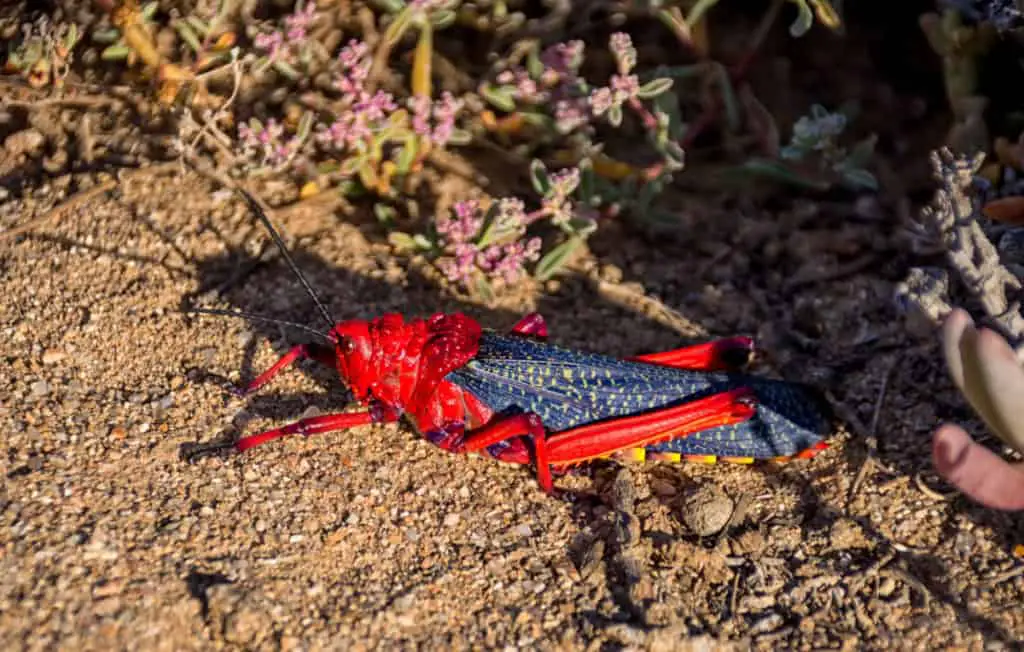
Although the poison is not potentially harmful to humans, it is important to stay away from poisonous grasshoppers to avoid complications. Do not ingest unknown grasshoppers as it can lead to irritations if the grasshopper is a poisonous one.
What Sort Of Materials Do Grasshoppers Chew On?
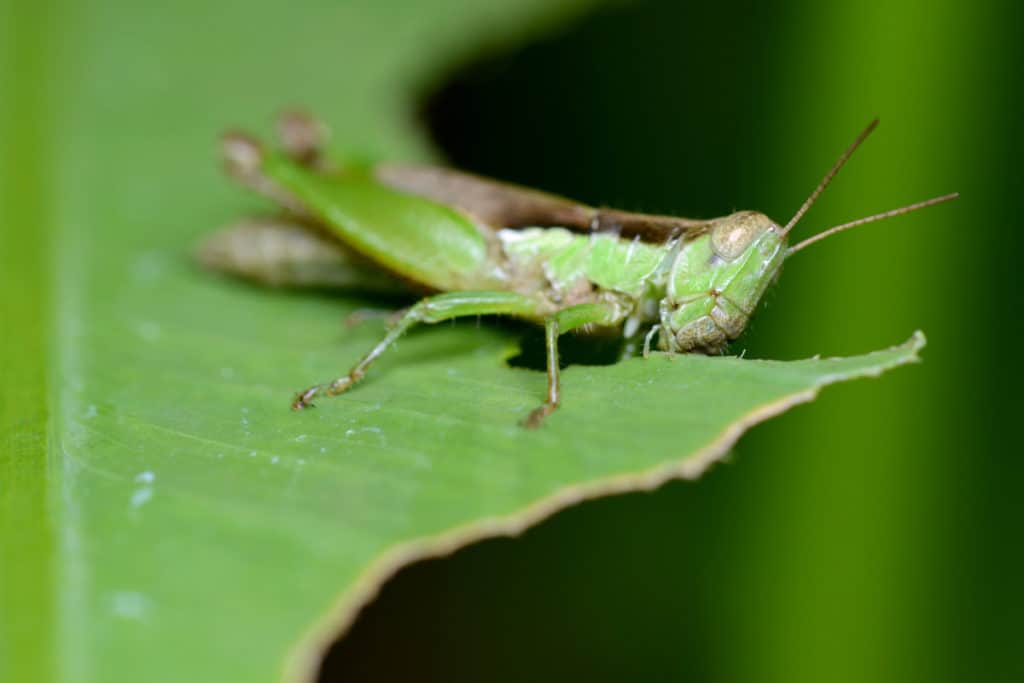
Grasshoppers are mostly herbivores; they chew on plants like clovers and cotton. But some species are omnivores as they feed upon foliage such as leaves and fungi such as mushrooms. They will also eat gross stuff like animal dung or even dead animals.
These insects generally thrive in moist conditions, where there is optimum plant growth.
Random fact: Although grasshoppers do not consider it a food source, they love to chew holes through window screens.
How To Get Rid Of Grasshoppers
To prevent grasshoppers from getting in your garden or in your house, try the following methods:
- Plant the plants that attract grasshoppers, such as lettuce and beans, along the border of your garden. This can help keep them outside the garden.
- Spray natural insecticide more than once around the garden or yard. This will prevent the grasshoppers from coming in. The best place to apply the natural insecticide is at their breeding sites, where their eggs hatch. Neem oil is an excellent natural insecticide.
- Tilling the ground can not only make the soil richer, but it can also prevent the female grasshoppers from laying their eggs. Consequently, these insects may find new breeding sites and leave your garden.
- Sprinkle all-purpose flour on the leaves of your plants to get rid of grasshoppers. All-purpose flour tends to stick to the mouthparts when the grasshoppers consume it. However, make sure it is not any other flour, as some contain salt, and salt can damage your plants.
- If none of the above methods work, you can leave the job to grasshopper’s natural predators, frogs. Leave one or two in the garden to get rid of the grasshoppers.
There are many ways to kill a grasshopper. However, these insects play an important role in our ecosystem, and it is not ideal to kill them. Use natural methods that encourage them to leave your garden.
If you live in Florida and you are wondering what species of grasshoppers you might be up against, then check out this article we have written, Grasshoppers In Florida: Your Complete Guide.
What Are The Benefits Of Grasshoppers?
Like any other insect, grasshoppers play a role in nutrient recycling and maintaining the food chain. These insects feed on leaves, grasses, and even dead animals. Their predators include birds, frogs, and snakes.
Although grasshoppers feed on plants and can damage crops, they facilitate plant decomposition and regrowth.
In short, if grasshoppers become extinct, the population of higher organisms on the food chain will also decline in number. Therefore, do not kill grasshoppers. Encourage them to leave your yard using grasshopper repellants or other natural methods.
The Wrap Up
To conclude, grasshoppers do not bite as they have tiny mouths that cannot do much damage. But instead of biting, they spit or use their spiked legs to defend themselves. Some brightly colored species can even release poison when they feel threatened.
However, grasshoppers do not pose any threat to humans. Their stain can temporarily stain your skin, and the spiked legs can irritate your skin. Although grasshoppers are not dangerous to humans, do not ingest these insects as there may be remains of insecticides or chemicals on their body surface.
Sources
https://www.healthline.com/health/do-grasshoppers-bite#summary
https://beyondthetreat.com/do-grasshoppers-bite/
https://www.ridmycritters.com/how-to-get-rid-of-grasshoppers/
https://en.wikipedia.org/wiki/Tillage
https://sciencing.com/do-grasshoppers-eat-5655099.html
